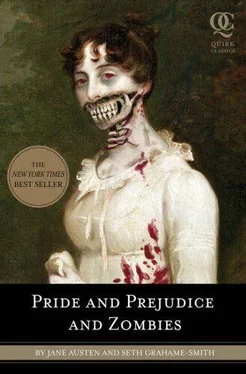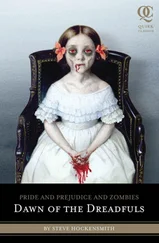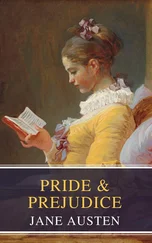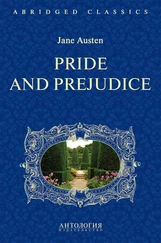“I knew,” said he, “that what I wrote must give you pain, but it was necessary. I hope you have destroyed the letter. There was one part especially, the opening of it, which I should dread your having the power of reading again. I can remember some expressions which might justly make you hate me.”
“Think no more of the letter. The feelings of the person who wrote, and the person who received it, are now so widely different from what they were then, that every unpleasant circumstance attending it ought to be forgotten. You must learn some of my philosophy. Think only of the past as its remembrance gives you pleasure.”
“With me, it is not so. Painful recollections will intrude which cannot, which ought not, to be repelled. I have been a selfish being all my life, in practice, though not in principle. As a child I was taught what was right , but I was not taught to correct my temper. I was given the best training, but left to use it in pride and conceit. Unfortunately an only son (for many years an only child ), I was spoilt by my parents, who, though good themselves (my father, particularly, all that was benevolent and amiable), allowed, encouraged, almost taught me to be selfish and overbearing; to care for nothing beyond the defense of my estate; to think meanly of all the rest of the world. Such I was, from eight to eight-and-twenty; and such I might still have been but for you, dearest, loveliest Elizabeth! What do I not owe you! You taught me a lesson, hard indeed at first, but most advantageous. By you, I was properly humbled. I came to you without a doubt of my reception. You showed me how insufficient were all my pretensions to please a woman worthy of being pleased.”
After walking several miles in a leisurely manner, and too busy to know anything about it, they found at last, on examining the precise position of the sun, that it was time to be at home.
“What could become of Mr. Bingley and Jane!” was a wonder which introduced the discussion of their affairs. Darcy was delighted with their engagement; his friend had given him the earliest information of it.
“I must ask whether you were surprised?” said Elizabeth.
“Not at all. When I went away, I felt that it would soon happen.”
“That is to say, you had given your permission. I guessed as much.” And though he exclaimed at the term, she found that it had been pretty much the case.
“On the evening before my going to London,” said he, “I made a confession to him, which I believe I ought to have made long ago. I told him of all that had occurred to make my former interference in his affairs absurd and impertinent. His surprise was great. He had never had the slightest suspicion. I told him, moreover, that I believed myself mistaken in supposing, as I had done, that your sister was indifferent to him; and as I could easily perceive that his attachment to her was unabated, I felt no doubt of their happiness together.”
Elizabeth could not help smiling at his easy manner of directing his friend.
“Did you speak from your own observation,” said she, “when you told him that my sister loved him, or merely from my information last spring?”
“From the former. I had narrowly observed her during the two visits which I had lately made here; and I was convinced of her affection.”
“And your assurance of it, I suppose, carried immediate conviction to him.”
“It did. Bingley is most unaffectedly modest. His timidity had prevented his depending on his own judgment in so anxious a case, but his reliance on mine made every thing easy. I was obliged to confess one thing, which for a time, and not unjustly, offended him. I could not allow myself to conceal that your sister had been in town three months last winter, that I had known it, and purposely kept it from him. He was angry. But his anger, I am persuaded, lasted no longer than he remained in any doubt of your sister’s sentiments. He has heartily forgiven me now.”
As they made for the house, Elizabeth and Darcy happened upon a herd of unmentionables, no more than a dozen in number, which had quartered itself in a garden not ten yards from the road. The creatures were crawling on their hands and knees, biting into ripe heads of cauliflower, which they had mistaken for stray brains. Elizabeth and Darcy laughed at the sight, and for a moment, resolved to keep walking-as the zombies had failed to take notice of them. But, sharing a glance and a smile, the pair realised they had stumbled onto their first opportunity to fight side by side.
And so they did.
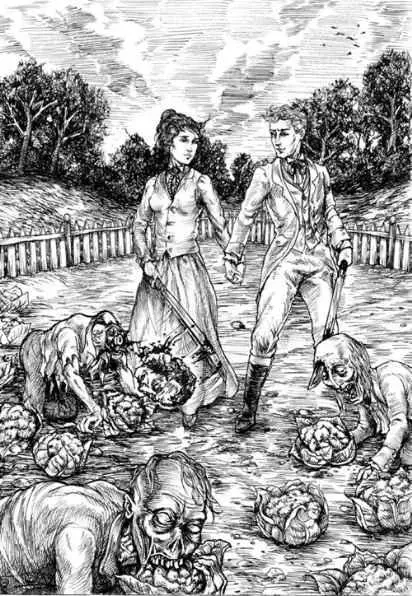
“THE CREATURES WERE CRAWLING ON THEIR HANDS AND KNEES, BITING INTO RIPE HEADS OF CAULIFLOWER, WHICH THEY HAD MISTAKEN FOR STRAY BRAINS.”
“MY DEAR LIZZY, where can you have been walking to?” was a question which Elizabeth received from Jane as soon as she entered their room, and from all the others when they sat down to table. She had only to say in reply, that they had wandered about, till she was beyond her own knowledge. She coloured as she spoke; but neither that, nor anything else, awakened a suspicion of the truth.
The evening passed quietly. The acknowledged lovers talked and laughed, the unacknowledged were silent. Darcy was not of a disposition in which happiness overflows in mirth; and Elizabeth, agitated and confused, anticipated what would be felt in the family when her situation became known.
At night she opened her heart to Jane. Though suspicion was very far from Jane’s general habits, she was absolutely incredulous here.
“You are joking, Lizzy. This cannot be! Engaged to Mr. Darcy! No, no, you shall not deceive me. I know it to be impossible.”
“This is a wretched beginning indeed! My sole dependence was on you; and I am sure nobody else will believe me, if you do not. Yet, indeed, I am in earnest. I speak nothing but the truth. He still loves me, and we are engaged.”
Jane looked at her doubtingly. “Oh, Lizzy! It cannot be. I know how much you dislike him.”
“You know nothing of the matter. That is all to be forgot. Perhaps I did not always love him so well as I do now. But in such cases as these, a good memory is unpardonable. This is the last time I shall ever remember it myself.”
Jane still looked all amazement. Elizabeth again, and more seriously assured her of its truth.
“Good Heaven! Can it be really so! Yet now I must believe you,” cried Jane. “My dear, dear Lizzy, I would-I do congratulate you-but are you certain? Forgive the question-are you quite certain that you can be happy with him?”
“There can be no doubt of that. It is settled between us already, that we are to be the happiest couple in the world. But are you pleased, Jane? Shall you like to have such a brother?”
“Very, very much. Nothing could give either Bingley or myself more delight. But we considered it, we talked of it as impossible. And do you really love him quite well enough? Oh, Lizzy! Do anything rather than marry without affection. Are you quite sure that you feel what you ought to do?”
“Oh, yes! You will only think I feel more than I ought to do, when I tell you all.”
“What do you mean?”
“Why, I must confess that I love him better than our games of Kiss Me Deer. I am afraid you will be angry.”
“My dearest sister, now be serious. I want to talk very seriously. Let me know every thing that I am to know, without delay. Will you tell me how long you have loved him?”
“It has been coming on so gradually, that I hardly know when it began. But I believe I must date it from my first seeing the way his trousers clung to those most English parts.”
Читать дальше
